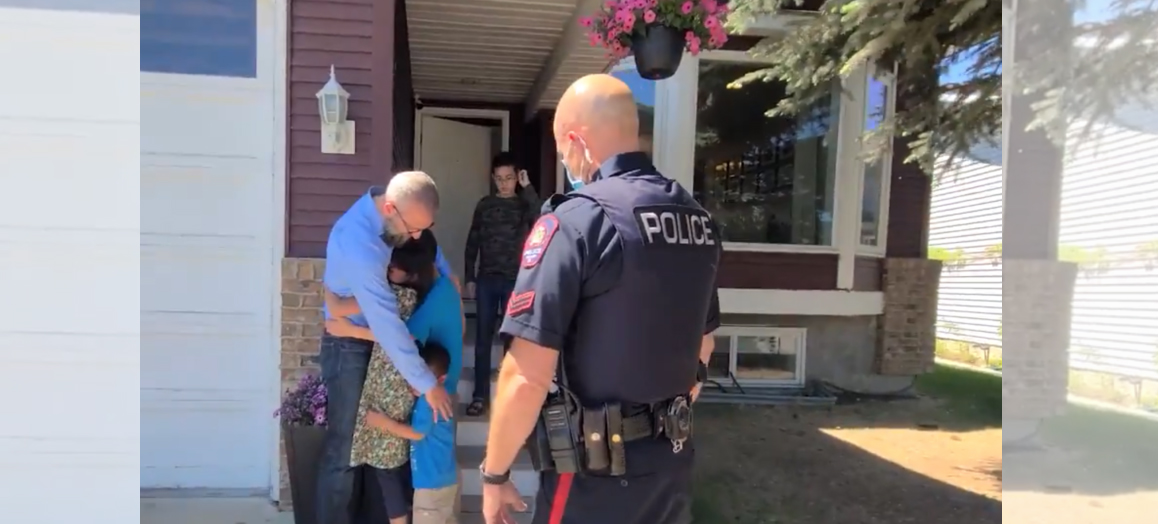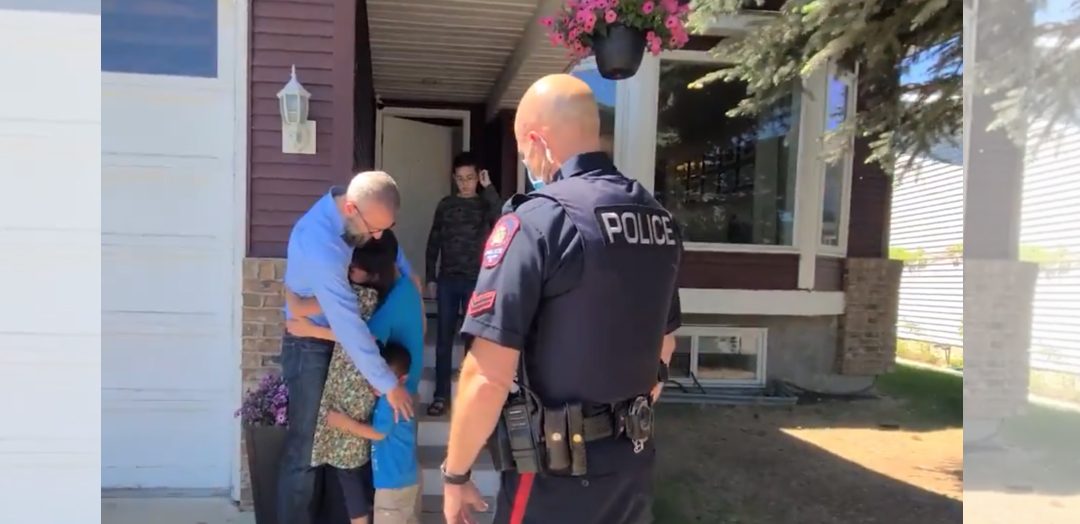
As I write, Pastor Tim Stephens of the Fairview Baptist Church in Calgary, Alberta, sits in jail—the third pastor from Alberta to be arrested and jailed for holding church services that do not meet the state’s coronavirus guidelines.
A heart-wrenching video posted on Monday shows Pastor Stephens arrested and taken from his home in front of his wife and eight distraught children. In the video, his children are sobbing out “Bye, Daddy” even as the police vehicle drives away.
What happened?
As I understand the situation, the Canadian government has restricted church services to 15 percent capacity of the church building. Pastor Stephens (as well as several other pastors across Canada) knew they could not worship Christ as He commands the church to do with this kind of limitation, especially as it has been imposed over many months and remains indefinite. In this particular instance, the church has also had zero cases of Covid, so they are confident holding services is not endangering their congregation or community.
The Fairview Baptist Church has been holding public services for months while practicing a carefully-thought out risk mitigation strategy. On Saturday, June 5, the Alberta Health Services physically barricaded entrance to the church building. The Sunday following, the church “went underground,” meeting in an undisclosed, outdoor location.
This past Sunday, June 13, a police helicopter located the outdoor location during services. The following morning, the police showed up to arrest Pastor Stephens. He is being held in jail until his June 28 trial because he refuses to accept the conditions of his bail—that he promise to not hold church services.
Is this religious persecution?
Even as I write this, I know there will be those who say, “This isn’t religious persecution. He could have just met the guidelines.”
But it’s not that simple. When the police send a helicopter to locate an outdoor gathering of Christians meeting for church while their own Prime Minister gathers without social distancing, it’s difficult to see this as a real desire to protect the public.
But even laying aside some of the obvious irregularities of how the authorities are handling this case—which the organization representing Pastor Stephens have pointed out—I think we should ask the question, “When does this become religious persecution?”
Frankly, even if you don’t want to call it “religious persecution,” can we at least recognize that it reveals a government that is hostile toward Christianity and hardened toward the spiritual needs of its citizens? And can we also note that jailing a non-violent person who simply will not agree to not hold outdoor services is harsh toward a pastor with sincerely-held religious convictions?
Was it religious persecution when John Bunyan was held in prison for twelve years because he would not accept a license to preach from the state church? He, too, could have been released if he would have been willing to accept the license. He refused because of his conviction that Christ—not the state—is the head of the church.
While the church I pastor and many others I know made a sincere effort to love our neighbors by briefly moving to online services at the beginning of the pandemic, we could not and did not do this indefinitely, as our state seemed to indicate they would require.
The church is the Lord’s (Acts 20:28), and He has commanded us to assemble (Hebrews 10:25). Without an eminent threat and, in fact, without any imperial evidence that assembling with safety strategies in place would spread the virus, we determined to assemble—safely, but in obedience to Christ.
What can we do?
1. Pray for Pastor Stephens, his family, and church.
I have never met Pastor Stephens. I am aware that aspects of his doctrinal persuasion are different than mine. But he is a Baptist pastor who is preaching the gospel and willing to go to jail rather than relinquish his responsibility as an under shepherd of Christ’s flock. I greatly respect that and am praying for him, his family, and his church family.
Pray also for the two other pastors in Alberta who have been jailed and are still facing charges. Their names are James Coates and Artur Pawlowski.
Remember them that are in bonds, as bound with them; and them which suffer adversity, as being yourselves also in the body. (Hebrews 13:3)
2. Understand the urgency of our cultural moment.
I’m not one for political grandstanding or making hyperbolic statements. But I am concerned that Christians are misreading or are oblivious to the significance of the cultural changes happening around us.
The worldview of the average person has profoundly shifted over the past ten years. A poll this winter concluded that 26 percent of adults in the US and 52 percent of adults in Great Britain do not even believe in God. (This is up from the 2008 numbers of 17 percent and 43 percent, respectively.)
Our world needs the gospel like never before. Your city needs the gospel. Now is not the time to shift our focus to politically-correct social issues or terminology that we perceive will make us more received by our culture. Our culture is already determined to both define and address those issues in godless ways. While there is no need to be purposefully offensive, we must remember that the message of the gospel will offend.
Do justly, yes. Care for widows and fatherless, yes. Show mercy and compassion in every way that is consistent with biblical Christianity.
But don’t stop declaring the gospel! And refuse to allow our culture to redefine the biblical meanings of sin and righteousness, the reality of an individuals accountability to God, and the true and only hope for the sinner found in the blood atonement of Jesus Christ.
For I am not ashamed of the gospel of Christ: for it is the power of God unto salvation to every one that believeth; to the Jew first, and also to the Greek. (Romans 1:16)
For the preaching of the cross is to them that perish foolishness; but unto us which are saved it is the power of God. (1 Corinthians 1:18)
3. Count the cost.
Jesus never promised the Christian life would be easy. In fact, He specifically told us it would be hard (John 16:33), and He specifically told us to count the cost of following Him.
For which of you, intending to build a tower, sitteth not down first, and counteth the cost, whether he have sufficient to finish it? Lest haply, after he hath laid the foundation, and is not able to finish it, all that behold it begin to mock him, Saying, This man began to build, and was not able to finish. … So likewise, whosoever he be of you that forsaketh not all that he hath, he cannot be my disciple. (Luke 14:28–30, 33)
I don’t know what persecution may come to Christians in the United States. I pray for a national spiritual awakening that could, at least temporarily, stem the tide of wickedness in our land.
But as Christians around the world suffer and are even martyred for their faith, we shouldn’t be unwilling to do the same.
When it comes to the issues that have been raised by Covid-19—specifically the legality of government intervention on churches’ right to assemble—I believe pastors and Christians would be wise to settle in their own hearts what their biblical convictions in this area are. I have done that, and I have shared it with our church family in person and in a previous blog post.
We can’t truthfully say that we have counted the cost if we don’t even know what our biblical convictions are. I doubt that the cost we are called to make will begin with a gun to the head and a command to deny Christ. It will be—indeed, it has been—more subtle than that.
The temptation to compromise the truth and deny the right of God to define it doesn’t necessarily come in a single moment of obvious martyrdom. Instead, it often comes in a series of decisions that an uncommitted Christian can explain away. (“I believe the Bible says homosexuality is a sin; I just choose not to preach about it lest I offend those who need Christ.” “I know the church must assemble, and we will begin as soon as the government says we can.”) Perhaps what makes these decisions so difficult is the fact that even other Christians will sometimes be more quick to say you are misreading the moment than they are to encourage and support you in your stand.
I encourage you, reader, don’t misread this moment. Pray for Pastor Stephens. Embrace the urgency to declare the gospel. Count the cost…and stand.




